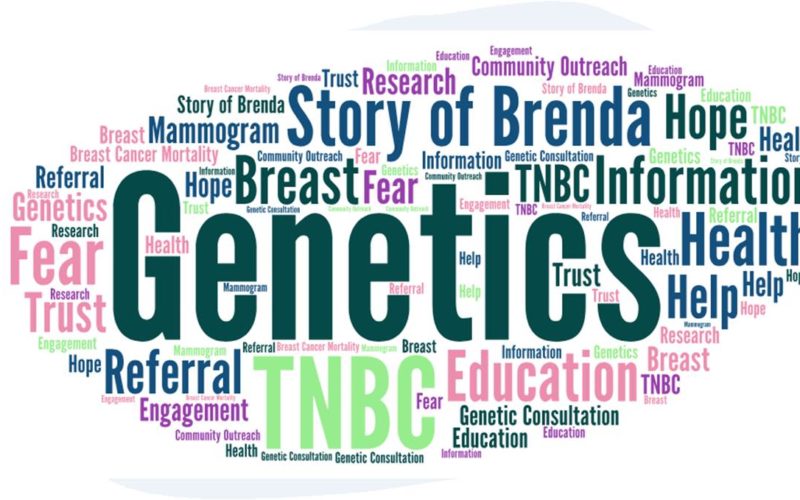Community volunteers share The Story of BRENDA “with and for Love”
Outreach program inspires Delaware women to reduce their risk for triple negative breast cancer

For reasons that researchers do not yet understand, Delaware women — especially African-American Delaware women — are among those at highest risk for an aggressive form of breast cancer known as triple negative breast cancer.
There is currently no effective hormone therapy to prevent the spread or return of this fast-growing cancer. It affects 33 percent of black women diagnosed with breast cancer treated at Christiana Care’s Helen F. Graham Cancer Center & Research Institute, compared with 12 percent of Caucasian women. Across the state, the incidence of triple negative breast cancer is higher than anywhere else in the nation. According to the National Cancer Institute, about 21 women out of 100,000 are diagnosed with the cancer, up from the U.S. average of 15.5 per 100,000 women.
It’s time to bring those numbers down, says a group of about 30 volunteer ambassadors who will soon head to ZIP codes throughout the City of Wilmington to lead free educational sessions on triple negative breast cancer and its impact on the African-American community.
The volunteers — some inspired by a friend or loved one’s breast cancer journey, and others who are cancer survivors themselves — will share The Story of BRENDA with their sisters in faith, profession and community. Their goal: to empower at least 1,500 women with the knowledge to prevent triple negative breast cancer or find it at its earliest, most treatable stage.
Shea Faucett Robinson, diagnosed with breast cancer herself four years ago, signed up to share The Story of BRENDA to honor one friend currently in hospice and another who recently learned that her triple negative breast cancer had returned after four years. Faucett Robinson also volunteered for BRENDA to carry on the legacy of her beloved friend, Love Congo.
Congo, who died in 2018, was one of the first members of Christiana Care’s Community Research Advisory Board formed to help researchers identify issues important to the community. One of the board’s first accomplishments was to follow through on the community members’ request for more education. The Story of BRENDA, with its empowering message of lifestyle choices that may help reduce the risk for triple negative breast cancer, is the result of the board’s shared commitment to make this request a reality.
“Love would stand up here and ask ‘What can I do to make a difference?’” Faucett Robinson said. “I am sharing The Story of BRENDA for Love and for all women.”
Remember my name — BRENDA!

BRENDA is not a real person, but the fictitious character’s story is based on far too many women in Delaware and across the nation facing a far-to-real diagnosis or increased risk for triple negative breast cancer. BRENDA is actually a mnemonic, an easy way to remember several related concepts, such as the six essential steps to reduce the risk for breast cancer:
- Breastfeed.
- Reduce consumption of alcoholic and sugary beverages.
- Exercise 2 ½ hours each week.
- Nutritious foods.
- Do not smoke.
- Achieve a healthy body weight.
The Story of BRENDA teaches that genetic counseling and testing are other important ways to reduce breast cancer risk.
Genetic counseling involves reviewing personal and family medical history with a qualified and licensed clinical genetic expert for clues that might point to increased risk for certain types of cancers. Genetic counseling and testing are very important tools in the fight against triple negative breast cancer, said Zohra Ali-Khan Catts, MS, LCGC, director of Cancer Genetic Counseling for Christiana Care. The information helps doctors create a personalized screening plan for the woman who was tested, as well as provide tailored screening recommendations for her family members.
BRENDA also helps women understand how clinical trials increase treatment options and help researchers find new, targeted treatments.
“We could not have created BRENDA without the community’s partnership,” said Jennifer Sims-Mourtada, Ph.D., senior research scientist and director of Translational Breast Cancer Research for Christiana Care. “We hope these presentations will lead to stronger relationships throughout the community, not only to increase participation in genetic testing and clinical trials, but to bring us closer to our community so they can help drive future research questions.”
All breast cancers are not the same
Any woman can develop triple negative breast cancer, but it is more common in African-American women — especially those who descend from West Africa — in younger women and in women with mutations in certain genes, such as BRCA1.
Unlike other forms of breast cancer, triple negative tumors do not feed on any of the three common breast cancer receptors: estrogen, progesterone or the HER-2/neu gene. If a cancer is estrogen-positive, for example, it needs estrogen to grow. The well-known hormone therapy tamoxifen helps to block estrogen and reduces the risk that the cancer will come back or spread to other parts of the body. But medicines like tamoxifen don’t work on triple negative breast cancer, and so far, researchers have not found one that does.
While women of color are nearly three times as likely as Caucasians to develop triple negative breast cancer, according to Diana Dickson-Witmer, M.D., FACS, medical director of the Christiana Care Breast Center, most of what researchers know about the disease comes from genetic testing on Caucasian women.
High rates of triple negative breast cancer in West African populations make researchers believe that there is something in how their DNA developed generations ago that resulted in people of African descent being at greater risk for this aggressive kind of cancer. Yet only about 2 percent of DNA samples available for genetic studies are from black women.
“If we can encourage more women with African DNA to participate in genetic counseling and testing, we hope to come up with better tools to help them survive,” Dr. Dickson-Witmer said.
Do it for someone else
Gemma Lowery, eICU operations coordinator for Christiana Care, is one of the volunteers eager to share The Story of BRENDA with her community. Lowery was adopted.
She has no knowledge of her own family medical history and few clues about her own risk for triple negative breast cancer so she is diligent about prevention and screening. She watched her stepmother, who is of Ashkenazi (Eastern European) Jewish ancestry, face four cancer diagnoses. Along with African-Americans, Ashkenazi Jews are also at increased risk for triple negative breast cancer.
Her adoptive mom also suffered scares with dense breast biopsies. Though the three women do not share a bloodline, their bond motivates Lowery to do all in her power to help drive down Delaware’s triple negative breast cancer rate for the benefit of all women.
She also does it for her three sons, who may someday pass down her genes to future generations.
Lowery is particularly passionate about encouraging people of color to participate in genetic testing. While she understands the history-based cultural fear that remains from the infamous and unethical Tuskegee Study of Untreated Syphilis in the Negro Male and Henrietta Lacks, the African-American woman whose cells were pivotal in 1950s medical research without her informed consent, Lowery believes genetics hold the key to saving more people from triple negative breast cancer.
“I just don’t think that fear is any longer a reason to die,” she said. “We need to understand that genetic testing gives us the power to do something to help someone else, and we need to be part of the gene pool to find the missing answers,” she said.
BRENDA volunteer Dorian Corey-Williams, a triple negative breast cancer survivor, agrees.
“If we can save the ones coming behind us, let’s do it!” she said.
“We’re doing it — with and for Love.”
Sarah Harrison, MBA, also a founding member of the Community Research Advisory Board, lost her mother at a relatively young age to breast cancer decades ago, long before researchers had identified more than one type of the disease. This spurred Harrison’s lifelong passion to better educate her five sisters and others in the community to practice prevention measures, get screened early for cancer and become more knowledgeable about the importance of participating in genetics and cancer research.
Harrison, who is a Christiana Care Trustee and also chairs the physical and mental health committee of Delta Sigma Theta Sorority, Inc., Wilmington Alumnae Chapter, said she has seen more willingness in recent years across all age groups for people to step up and share what they have learned to help others.
“We have seen so much improvement and we simply cannot stop,” she said. “The more we work together collectively, the greater our reach will be.”
Nora Katurakes, MSN, RN, OCN, manager of Community Health Outreach & Education at the Graham Cancer Center, said events like the BRENDA presentations empower women and encourage families to embrace the opportunity to talk about clinical trials and genetics at the time of diagnosis. Key to the program’s success, she said, are the amazing women who have committed to share the message with all who will listen.
“Love Congo really wanted the impact of this important outreach to continue,” Katurakes shared with those attending the first training session for BRENDA volunteers.
To schedule a free presentation of The Story of BRENDA for your community group, contact Christiana Care’s Community Health Outreach Department at the Helen F. Graham Cancer Center & Research Institute at 302-623-4661. For more information about genetic counseling and testing, contact Christiana Care’s Genetic Risk Assessment Program at 302-623-4593.